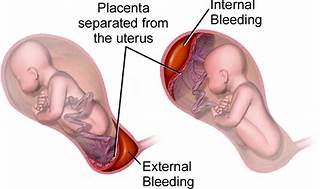A nurse is caring for a client who is postpartum. Which of the following findings is an indication for the nurse to administer Rho(D) immune globulin?
The client is Rh positive and the newborn is Rh negative.
The client is Rh negative and the newborn is Rh positive.
The client is Rh negative and the newborn is Rh negative.
The client is Rh positive and the newborn is Rh positive.
The Correct Answer is B
Choice A rationale:
If the client is Rh positive and the newborn is Rh negative, there is no indication for administering Rho(D) immune globulin. Rho(D) immune globulin is only given when the Rh-negative mother gives birth to an Rh-positive baby.
Choice B rationale:
This is the correct choice for administering Rho(D) immune globulin. When the mother is Rh negative and the newborn is Rh positive, there is a risk of Rh incompatibility. If the fetal blood enters the mother's circulation during delivery, her immune system may produce antibodies against Rh-positive blood cells, which can be harmful to future Rh-positive pregnancies. To prevent this, Rho(D) immune globulin is administered to the Rh-negative mother shortly after delivery.
Choice C rationale:
If both the mother and the newborn are Rh-negative, there is no risk of Rh incompatibility. Rho(D) immune globulin is not required in this situation.
Choice D rationale:
If both the mother and the newborn are Rh-positive, there is no risk of Rh incompatibility. Rho(D) immune globulin is not indicated in this case.
Nursing Test Bank
Naxlex Comprehensive Predictor Exams
Related Questions
Correct Answer is C
Explanation
Choice A rationale:
Helping the client to the bathroom to empty her bladder is not the appropriate response in this situation. The client's sudden urge to push indicates that she is in the second stage of labour, which is the pushing phase. The cervix is already dilated at 7 cm, and the fetus is at 1+ station, indicating that delivery is imminent. Emptying the bladder at this point is not a priority and may delay necessary actions.
Choice B rationale:
Assisting the client into a comfortable position is also not the appropriate response. The client's urge to push suggests that she is in the active stage of labor, and her cervix is already 7 cm dilated. Encouraging a comfortable position might not be suitable since the focus should be on monitoring the progress of labor and preparing for delivery.
Choice C rationale:
Having the client pant during the next few contractions is not the correct response either. Panting is typically recommended during the transition phase of labor to prevent rapid pushing and potential damage to the perineum. However, in this scenario, the client is already fully dilated, and the fetus is at 1+ station, indicating that the second stage of labour has commenced. Panting is not necessary at this point.
Choice D rationale:
The appropriate nursing response is to assess the perineum for signs of crowning. The sudden urge to push indicates that the baby is descending through the birth canal and may be close to crowning, which is when the baby's head becomes visible at the vaginal opening. By assessing for crowning, the nurse can determine if delivery is imminent and notify the healthcare provider for further actions and preparation for the baby's birth.
Correct Answer is A
Explanation

The correct answer is choice A, Maternal hypertension.
Choice A rationale:
Maternal hypertension is widely recognized as the most common risk factor for placental abruption. High blood pressure can cause the placenta to detach from the uterine wall, leading to abruption. In summary, while all the listed factors can contribute to the risk of placental abruption, maternal hypertension stands out as the most common cause, supported by multiple health sources. It’s important for nurses to recognize and manage hypertension in pregnant clients to minimize the risk of this serious complication.
Choice B rationale:
While maternal cocaine use is a significant risk factor for placental abruption due to its vasoconstrictive effects, which can compromise the placental blood flow, it is not as common as maternal hypertension.
Choice C rationale:
Maternal cigarette smoking is also a risk factor for placental abruption. Smoking can lead to a variety of complications in pregnancy, including placental problems, but again, it is less common than hypertension as a cause for abruption.
Choice D rationale:
Maternal battering can lead to trauma which may result in placental abruption. However, it is not considered the most common risk factor when compared to maternal hypertension.
Whether you are a student looking to ace your exams or a practicing nurse seeking to enhance your expertise , our nursing education contents will empower you with the confidence and competence to make a difference in the lives of patients and become a respected leader in the healthcare field.
Visit Naxlex, invest in your future and unlock endless possibilities with our unparalleled nursing education contents today
Report Wrong Answer on the Current Question
Do you disagree with the answer? If yes, what is your expected answer? Explain.
Kindly be descriptive with the issue you are facing.
